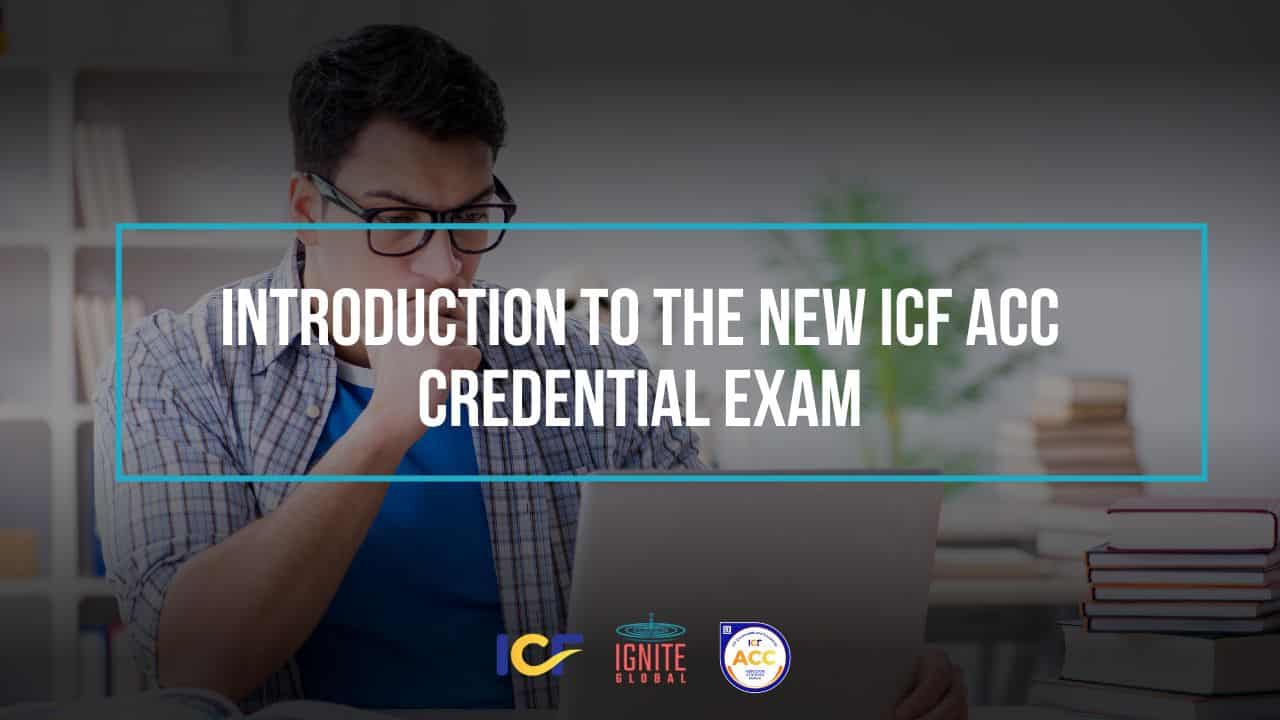Table of Contents
ToggleIntroduction to the new ICF ACC Credential Exam
The International Coaching Federation (ICF) has implemented a new exam format tailored specifically to the Associate Certified Coach (ACC) level, designed to better align with the requirements for this credential. With this update, ACC candidates are now required to demonstrate their ability to apply the ICF Core Competencies in practical coaching scenarios, ensuring a deeper understanding of coaching principles. This revamped ACC exam is designed to align more closely with the real-world applications of coaching, making it a pivotal step for new coaches entering the field. While the overall ICF Credentialing Exam applies to all levels, there are distinctions in the specific requirements for ACC candidates compared to higher-level credentials.
Understanding the ICF ACC Credentialing Exam
The ACC Credentialing Exam evaluates a coach’s ability to apply the ICF Core Competencies in realistic coaching scenarios. Candidates must pass this exam to demonstrate their coaching knowledge and readiness for professional practice. The ACC Credentialing Exam contains scenario-based questions that test the application of coaching principles in real-world contexts, aligning with the ICF Core Competencies and Code of Ethics.
To qualify for the ACC credential, candidates are required to fulfill specific prerequisites:
- 60 hours of coach-specific education.
- 100 hours of client coaching experience, including at least 75 paid hours.
- 10 hours of mentor coaching with a qualified mentor.
The ACC exam can be taken once these prerequisites are met, following submission of the application and approval by ICF. The exam is offered through Pearson VUE, with options for in-person or remote proctored testing.
The ACC Exam will be available to candidates starting on November 18, 2024. All ACC candidates approved for the written exam as of that date will be eligible to take it.
Structure of the ICF ACC Exam
The ACC Exam includes 60 multiple-choice questions. Each question presents a brief prompt or query with four answer options, and only one is correct.
The exam is divided into two sections, with an optional 10-minute break in the middle. The total time for the exam is structured as follows:
Exam Instructions: 2 minutes
Section 1: 30 questions (39 minutes)
Scheduled Break: 10 minutes (optional)
Section 2: 30 questions (39 minutes)
Exam Format
The exam duration is 90 minutes, which includes a 10-minute break.
Exam Length: 60 multiple-choice questions
Exam Format: Computer-based written exam, available either at Pearson VUE testing centers worldwide or remotely via Pearson’s OnVue proctoring service.
Exam Content
The ACC Exam covers three primary domains of coaching knowledge, with questions distributed as follows:
Coaching Ethics
- Understanding professional ethics codes.
- Recognizing conflicts of interest.
- Familiarity with laws, regulations, and policies related to confidentiality (e.g., conditions requiring a breach of confidentiality).
Definition and Boundaries of Coaching
- Understanding the definition of coaching.
- Knowledge of the coaching process and its distinctions from other professions such as therapy, counseling, mentoring, and consulting.
- Knowing when and how to refer clients to mental health professionals.
- Recognizing signs of mental health conditions that may impede coaching progress.
Coaching Competencies, Strategies, and Techniques
- Knowledge of how to create a coaching contract (e.g., key elements of a coaching agreement).
- Understanding the ICF Core Competencies.
- Knowledge of goal setting and motivational strategies.
- Familiarity with various coaching techniques, tools, and resources..
Complexity of Scenarios
The exam is specifically designed to match the career stage of most ACC candidates, typically those in the early to mid stages of their coaching career. The exam uses knowledge-based questions that are generally presented in shorter, simpler sentences compared to the more complex situational judgment format used in the ICF Credentialing Exam. However, it’s important to emphasize that this does not mean the exam is ‘less challenging’.
Tips to Ace the ICF ACC Credentialing Exam with Excellence
Preparing for the ICF ACC Credentialing Exam can feel like a significant challenge, but with the right approach, it becomes a pathway to building a solid foundation for your coaching practice.
The International Coaching Federation (ICF) encourages candidates to prepare for the ACC Credentialing Exam by focusing on key areas of coaching knowledge and application. These preparation tips are designed to help candidates feel confident and well-equipped for the exam.
Below are the essential points ICF recommends for effective exam preparation.
1.Revisit Materials from Your Coaching Education Program
Your coaching education program is designed to align with the ICF Core Competencies and the ethical framework that underpins professional coaching. Revisiting these materials will refresh your understanding of the coaching methodologies, tools, and techniques you’ve learned.
Familiarizing yourself with the curriculum ensures that you have a comprehensive grasp of coaching processes, ethical guidelines, and performance-based learning. Review your training manuals, class notes, recorded coaching sessions, and any feedback you’ve received from mentors or peers. Focus on areas like goal setting, active listening, and ethics since these will likely form the foundation of the questions asked in the exam
2.Familiarize Yourself with the ICF Core Competencies
The ICF Core Competencies are the backbone of the coaching profession, and understanding them deeply is crucial for passing the ACC exam. These competencies cover areas such as establishing agreements, creating trust, active listening, and facilitating client growth.
The exam tests not only your theoretical knowledge but also your ability to apply these competencies in real-life coaching scenarios. Each question you encounter on the exam will relate to one or more of these competencies. Make sure you can clearly articulate what each competency means, how it applies in practice, and how you use these competencies to create an impact with your clients. Consider discussing examples with a peer or mentor to better understand how to apply them in coaching situations.
3.Review the ICF ACC Minimum Skills Requirements
In addition to understanding the ICF Core Competencies, it’s essential to know the specific skills expected from an ACC-level coach. These skills represent the baseline expectations for a professional coach and include the ability to establish coaching agreements, demonstrate ethical practices, and support clients in creating achievable action plans.
Knowing these skills helps ensure that your responses on the exam meet the minimum standards expected by ICF for ACC credentialed coaches. This is particularly critical for scenario-based questions where multiple responses might seem correct, but only one will reflect the ACC-level minimum requirement. The ICF ACC Minimum Skills Requirements document is typically found through your coaching program or on the ICF website.
Practice reflecting on how these skills manifest in your coaching sessions and ensure you can relate them to real-life examples.
4.Study the ICF Code of Ethics Standards, Including Key Definitions and Interpretive Statements
The ICF Code of Ethics is a vital part of your credentialing process. The exam will test your understanding of these ethical standards, especially how they apply in coaching situations. Topics covered include confidentiality, client autonomy, conflict of interest, and maintaining professional boundaries.
Coaching ethics guide your professional behavior and decision-making. During the exam, you may be presented with ethical dilemmas or scenarios where you must choose the best course of action in line with the ICF Code of Ethics. Focus on key sections of the Code of Ethics, such as confidentiality and conflict resolution. Pay close attention to interpretive statements that explain how certain principles are applied in practice. Engage in case study reviews to test your understanding of ethical decision-making.
5.Reflect on Typical Coaching Situations and Effective Responses
The ICF ACC exam is designed to assess your practical application of coaching principles. The best way to prepare for this is by reflecting on common coaching scenarios and considering the most effective ways to address client challenges.
The exam’s scenario-based questions require you to choose the best and worst responses to coaching situations. Familiarity with typical coaching challenges will help you recognize the most effective responses during the exam. Reflect on past coaching experiences, or simulate coaching scenarios with a peer coach. Discuss different responses and evaluate them based on ICF standards. The key is to practice thinking critically about what the client needs and how to best facilitate their growth within a coaching session.
6.Review Guidelines for Referring Coaching Clients to Therapy or Other Supporting Professionals
As a coach, it’s important to understand your boundaries and know when a client’s issues fall outside the scope of coaching. The ACC exam may test your knowledge of when and how to refer clients to therapy or other professionals.
Referral is an important part of maintaining ethical practice and ensuring clients receive the appropriate support. Knowing when to refer a client and how to do it professionally will be tested in ethical scenarios on the exam. Familiarize yourself with the ICF’s guidelines on referrals. Understand the key indicators for when a client may need therapy instead of or in addition to coaching. Practice formulating responses that involve sensitive and professional referral processes.
Additional Preparation Tips
Take Practice Tests: Use any practice questions available through your coaching program or ICF resources. This will help you get used to the format of the questions and manage your time effectively during the exam. For your reference, you may check out this practice test from Ignite Global.
Engage in Peer Study Groups: Discussing key topics with peers who are also preparing for the ACC exam can provide new perspectives and help solidify your understanding.
Final Words
As you prepare for your ICF ACC Credentialing Exam, remember that every step of your journey has built up the knowledge and skills that will serve you well on exam day. Trust in your training, lean on your experience and embrace the ICF Core Competencies that have guided your growth as a coach.
Take this opportunity to reflect on how far you’ve come and the potential you have to make a significant impact in the lives of your clients. The exam is not just a test, but a celebration of your readiness to step into the coaching profession with confidence and competence.
We wish you the very best as you embark on this final milestone toward achieving your ACC credential. May you approach the exam with clarity, calm, and confidence, knowing you have what it takes to succeed. Good luck!












